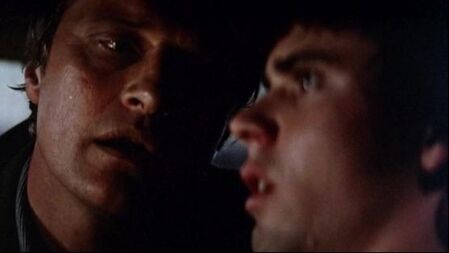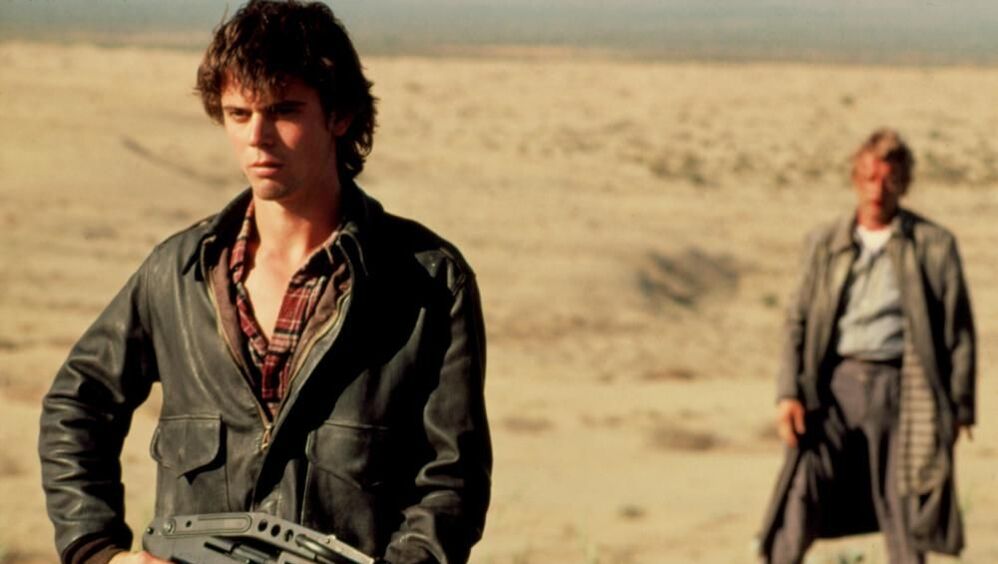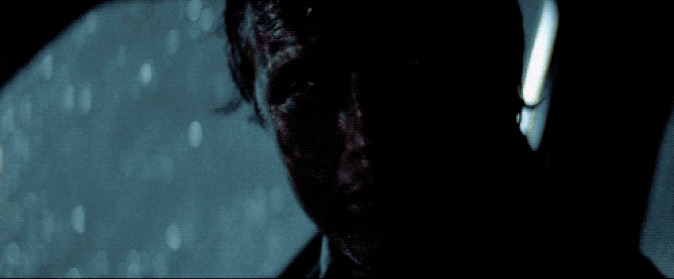 “I’m gonna sit here, and you’re gonna drive…” …Thirty-five years ago, star Rutger Hauer, aka “John Ryder”, uttered those threatening words to a terrified Jim Halsey (C. Thomas Howell) in director Robert Harmon’s The Hitcher. Celebrating its 35th anniversary this past weekend, the power of Hauer’s performance and the unsettling implications of his character resonates now just as much as it did then. WARNING: SPOILERS AND DISCUSSION OF ADDICTION AHEAD Written by Eric Red (Bad Moon), The Hitcher opens on a match lighting up the dark interior of a car being driven by Jim, a young, bright-eyed guy full of hopes and dreams of starting a life in California, on his way to drop the car off in the sun state and never look back. Driven by the naivety of youth, he spots John on the side of the road, caught in the rain, and decides to give him a ride, unaware of the mistake he’s just made. Dripping wet, not saying a word, John just stares at Jim. Taking him in. Sizing him up. There are few things more uncomfortable than being caught under the unwavering, intense gaze of Hauer’s eyes, especially when John reveals that he killed the last guy that picked him up. “I cut off his legs, and his arms, and his head, and I’ll do the same to you.” You can’t blame Jim if he wets his pants just a little. Those first fifteen or so minutes of The Hitcher are a masterclass in nail-biting tension, but what makes Harmon’s film one worth revisiting over and over again is that John Ryder is not your average psycho looking to slice a few pounds off of you. Despite his presentation as a man, John is more than that. He gets thrown from moving cars, beat up, shot, survives crashing through a goddamn windshield like a very large and very angry insect, and even manages to take down a helicopter with a single shot. He is super-human. His resilience to death walks the line of supernatural entity, made more interesting by the fact that John is the rare killer who wants to be stopped. John says as much as he holds a knife close enough to Jim’s eye to shave his eyelashes, telling him to repeat “I want to die,” before he looks away and says the words again, this time to himself. An acknowledgement of what he truly wants. Unlike the Norman Bates, Jason Voorhees and Leatherface’s of the horror-verse, John is a force that cannot be stopped, that won’t stop, but desperately wants to be stopped. He’s like the embodiment of the darkness within ourselves in that sense. Similar to Dexter Morgan’s “dark passenger,” John is this malevolent force that is with Jim, and us, everywhere we go along that road we call life. I’m an ex-smoker. I used to inhale anywhere from half a pack to a full pack a day. Instead of talking with others when I was upset with them, I’d walk away for a cigarette and leave them upset and frustrated behind me. I constantly knew the shame of sad eyes watching me slink off for that next puff in a dark alley, while friends, family and my wife all begged me to quit. And for the longest time, I didn’t care what any of them thought. That addiction was a monster that was stronger than me, and it consumed me, until it finally didn't. In the same way that we constantly battle our own inner demons, Jim is caught in a similar battle with John. Just as in our own lives, Jim finds himself celebrating small victories over the darkness, as he does when he initially manages to eject John from the car, screaming “I don’t want to die” and pumping his fist as he looks on in the rearview mirror, feeling a strength he’s likely never felt before. That sense of accomplishment we feel as the alcoholic who turns down a drink, or the smoker who throws away that pack of cigarettes. Every moment we defeat the darkness deserves celebration. But the cold, hard truth of The Hitcher is that the darkness within us is always there no matter how far we manage to get away. Everywhere Jim goes, John magically appears. The battle never truly ends. What matters is what we do about it. Some look at The Hitcher and John’s character as a madman anxious to turn Jim into a killer, but I don’t see it that way. John isn’t the sort of gleeful psycho who takes joy in making others like him. That’s not his purpose. He says what his purpose is: he wants to die, but he can only be stopped by someone who has the strength within them to stop him. That’s the unique side of The Hitcher, is that Jim is rarely ever truly in danger from the hands of John. It's everyone else that is in danger of knowing Jim. Aside from that threatening opening, every time Jim encounters John from that point on, John is pushing him. He doesn’t attack him when they meet again at the gas station shortly after the car attack, instead throwing Jim his keys, as if to say he’s everywhere, and has complete control. He frees Jim from prison. And when they meet at that diner late in the film, he’s practically begging Jim to pull the trigger of the gun he’s stolen. When Jim does, there’s a brief look of hope on John’s face that there will be bullets in that gun, followed by a sad but expected look of disappointment when there’s not. John is the metaphorical representation of the worst parts of ourselves. Wherever Jim, and therefore John, go, they leave a trail of destruction behind them. John forces Jim to face all of the greatest consequences of the darkness inside within a matter of 24 hours or so. No one believes him. Jim ends up in prison. He faces an onslaught of destroyed vehicles and death. and he even witnesses what happens to people he cares about who do try to understand, unintended targets of the darkness, letting love interest Nash (Jennifer Jason Leigh) die a brutal death when he’s too afraid to stand up to John. It's his guilt that finally drives Jim to face the darkness. Because only when we decide that facing it for ourselves is something we must do, can we begin to find the strength to do it. When Jim tracks John down and puts an end to the terror, the framing of John Seale’s breathtaking cinematography and Mark Isham’s melancholic score project a sadness to the moment, but underneath the surface, there’s a positive lesson to be learned, and it’s this: life is hard. It can be downright unbearable at times. Even the best of us have our internal struggles, and demons which claw and tear at us. But there is hope in The Hitcher’s ending, because it shows that, like Jim, we all have the strength within us to stand up to the darkness, no matter how powerless we at first seem. The Hitcher isn’t just one of the greatest road thrillers of all time, or my personal favorite Rutger Hauer performance. It’s a timeless classic that shows we all have the power within us to face that dark passenger that resides within. We don’t always win, but that’s okay. As long as we fight tomorrow. Whatever your dark passenger is, you can do it. Stand up to that darkness, throw it the hell out and leave it behind in the rearview mirror. By Matt Konopka Please consider joining us in celebrating Black History Month by donating to BlackLivesMatter.com
0 Comments
Leave a Reply. |
Archives
March 2023
|


 RSS Feed
RSS Feed